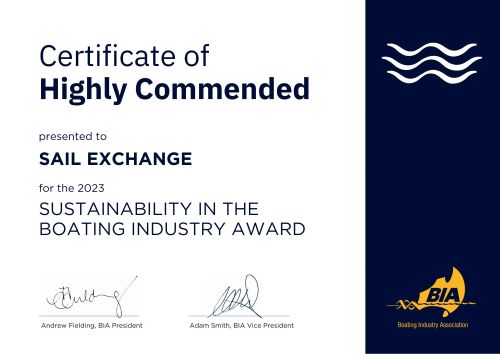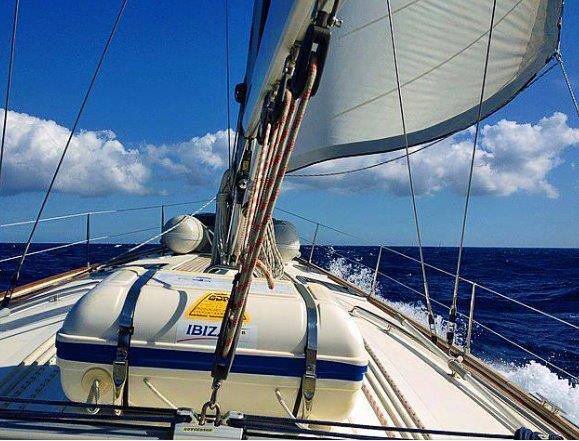Sustainability and Environmental Management
A sustainable solution for sailors
As sailors we derive spiritual joy by spending time in marine environments – from rivers, lakes, bays and coasts through to reefs, the open ocean and even our polar regions.
Sail Exchange believes that businesses within the yachting and boating industries have a particular responsibility to minimise environmental degradation resulting from the enjoyment of leisure craft.
We exist to facilitate the reuse of sails, providing boat owners with an affordable alternative to the purchase of new products and other yachting equipment while helping to reduce landfill and minimise the carbon footprint of the marine industry.
HIGHLY COMMENDED: SUSTAINABILITY IN THE BOATING INDUSTRY AWARD 2023
In recognition of our commitment to improving the sustainability of sailing through the reuse, resale and recycling of sails, we're proud to have been presented with HIGHLY COMMENDED: SUSTAINABILITY IN THE BOATING INDUSTRY AWARD 2023 by Australia's Boating Industry Association.

Sailing to sustainability
Sail Exchange embraces the UN Sustainable Development Goals, with a particular focus on Goal 12 'Ensure sustainable consumption and production patterns' and Goal 14 'Conserve and sustainably use the oceans, seas and marine resources for sustainable development'.
Sail Exchange believes that the future success and prosperity of our society depends on the sustainability of our environment, our communities and our business practices. We recognise the importance of considering the Environmental, Social and Governance (ESG) implications of our activities. We recognise that ESG considerations must also be part of our risk management framework and become part of our day-to-day decision-making processes. We believe that fulfilling these ESG responsibilities is best achieved by embedding ESG values in our policies, procedures and practices for the betterment of society.
Led by Sail Exchange Environmental Manager John Crockett (Bsc. Hons Resource and Environmental Management, Master of Environmental Management), Sail Exchange is working in-house and with technical partners to improve the sustainability of our day-to-day business operations and of the sail-making industry as a whole. Sail Exchange has adopted a sustainability management plan, developed in-house, to formalise aims and processes for achieving sustainable ESG outcomes.
Reduce through Reuse: used sails for sale
Thousands of sails are replaced by boat owners every year before the end of their usable life. Before Sail Exchange, they often adding to the clutter of household storage, or worse, ended up in landfill.
Providing for the reuse of sails at an international level we help reduce the demand for raw materials used in the production of new sails. Reduction in the use of resources and the reuse of manufactured products form key tenants of waste reduction.
REDUCE, REUSE, RECYCLE.
At Sail Exchange, we consign, review, rate, sell and ship used sails with the same exacting quality control standards we apply to the new sails we supply to give boat owners a lower-cost, high-quality alternative to buying new sails.
Repurpose
Our management goals include doing everything possible to avoid old sails that are beyond reuse from going into landfill and actively promoting and encouraging the repurposing of old sails and sail cloth for various purposes.
Our sails have been repurposed for:
- interior/exterior architectural design and decoration
- bags and other daily items.
- awnings and shelters
- bags and other daily items.\
- stage props, filming and photography and art installations
A scientific strategy
A primary environmental concern for the sail-making industry is that sails that are no longer fit for purpose but cannot be repurposed are also not recyclable. As sails are large and made of plastics, landfill often represents the only option for their disposal. This is an issue that should concern all involved in sailing.
The recycling of textiles, including those from which sails are made which remains in a developmental phase due to the complexities of recycling blended or composite materials.
Sail Exchange is working with partner James Forster of ENV Solutions, Sustainable Sailing in the UK and with The Department of Engineering at Macquarie University to investigate methods to recycle all types of sail cloth into high quality reusable raw materials for production including plastic monomers and carbon fibres.
Sail Exchange is proud to have committed financial support for textile recycling research by recently entering into an Enterprise Partnership Scheme with head researcher Professor Yijiao Jiang at Macquarie University. Prof. Yijiao and her team are exploring increasing the efficacy of textile recycling using alcoholysis. Sail Exchange facilitates research funding through a consignment-based contribution scheme.


